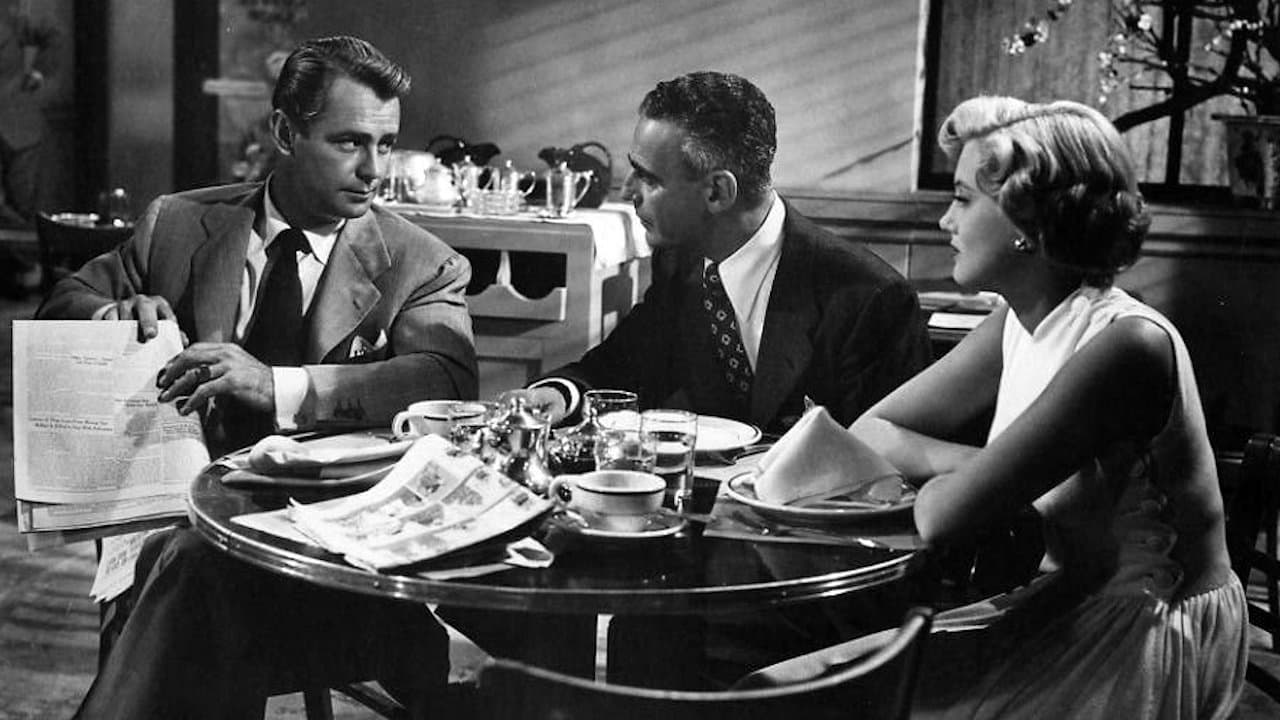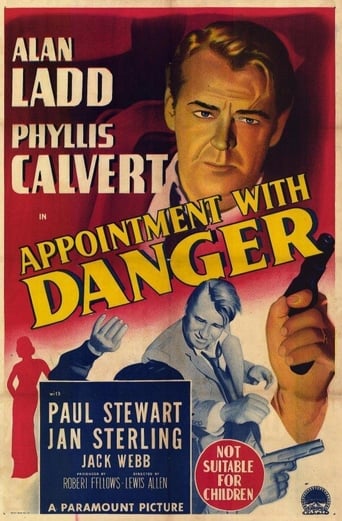Pluskylang
Great Film overall
Borgarkeri
A bit overrated, but still an amazing film
Fairaher
The film makes a home in your brain and the only cure is to see it again.
Janae Milner
Easily the biggest piece of Right wing non sense propaganda I ever saw.
seymourblack-1
Just as the plot of Anthony Mann's "T-Men" (1948) was based on a series of true incidents that were taken from the Treasury Department's own records, so "Appointment With Danger" uses a similar approach to tell its story about the work of the "U.S. Postal Information Service" which is claimed to be "the nation's oldest police force". Rousing music, shots of imposing buildings and an authoritative voice-over narration provide the movie with its introduction and kicks-off its account of an investigation that had to be undertaken when the dead body of one of its inspectors (Harry Gruber) was found in a rain-soaked alley in La Porte, Indiana.Chicago Postal Inspector Al Goddard (Alan Ladd) is put in charge of the investigation and immediately searches for an unidentified nun who, on the night of the murder, told a motorcycle cop that she'd seen two guys who seemed to be acting suspiciously. After finding Sister Augustine (Phyllis Calvert) at a church in Fort Wayne, Goddard takes her to a nearby police station where, after looking through a book of mug shots, she recognises George Soderquist (Harry Morgan) as one of the men she saw on the night in question. The young nun then assists further by accompanying Goddard and one of his colleagues to Gary, Indiana where Soderquist is known to be residing and again identifies him as he leaves a pool hall. When she leaves her concealed viewpoint in a café and goes outside to hail a cab, she's seen by Joe Regas (Jack Webb), who was with Soderquist on the night of the murder and he immediately becomes determined to kill her in case she can identify him.Goddard discovers that Gruber had been keeping a regular watch on a postal truck driver called Paul Ferrar (Stacy Harris) who was regularly employed in transferring shipments of money from a railway station in Gary and when he recognises that Ferrar was another of the men he'd seen at the pool hall, comes to the conclusion that Gruber had been killed because he'd discovered the existence of a plot to carry out a million dollar mail robbery. In an effort to sabotage the robbery, Goddard infiltrates the gang which is led by Earl Boettiger (Paul Stewart) and poses as a corrupt cop who can be bought for the right price. This plan puts him in considerable danger as his cover almost gets blown on a number of occasions. Regas never trusts him and gets involved in the main shootout that eventually brings the investigation to its conclusion.In a role that really suits his talents, Alan Ladd is excellent as the cynical, tough guy who's recognised as being a good cop but is also disliked by his fellow officers because he doesn't trust or like anyone else and thinks that everybody's a "pitch-artist". Phyllis Calvert hits all the right notes as the only person who makes him mellow a little because her character's obvious sincerity and unselfishness are so disarming. Jack Webb is great as Regas, the psychopathic thug who features in two of the movie's most memorable scenes (one being a brutal murder and the other being a handball game with Goddard in which all the pent-up aggression and antipathy that the two men feel towards each other is expressed in the way that the game is played). Harry Morgan is good as Regas' simple-minded partner and there are also solid supporting performances by Paul Stewart as the gang boss and Jan Sterling as his moll.Interestingly, "Appointment With Danger" is a documentary-style noir that also features some terrific expressionistic cinematography which adds considerably to its visual appeal. The dark wet streets, flashing neon lights and deserted industrial buildings that are seen at various points in the action are beautifully filmed and complement the mood of the piece brilliantly. Possibly the movie's most striking quality, however, is its dialogue which is peppered with tough talk and witticisms that make the accompanying action sizzle. Surprisingly, some of the best lines are delivered by the gang-leader's girlfriend who, after discovering what Goddard is doing, decides pragmatically not to tell her boyfriend. When Goddard starts to thank her, she simply replies "Don't bother. Earl was good to me. I hope he kills you".
Michael O'Keefe
Probably a lesser known Film Noir classic. A hardboiled special investigator Al Goddard(Alan Ladd)is assigned to Gary, Indiana to take control of the investigation of a U.S. Postal Inspector's death...murder. The cold hearted Goddard seeks out the only witness to the crime: a young nun Sister Augustine(Phylis Calvert). Goddard tracks down identity of the bad guys and uncovers a plot to rob a U.S. Mail truck of over a million bucks. The two key culprits are played by none other than Jack Webb and Harry Morgan(known for their detective duo roles on Dragnet). Paul Stewart plays the leader and brains of the gang and seems always to have his moll Dodie(Jan Sterling)in close company. The stoic Ladd fills the bill as Goddard. Also in the cast: Stacy Harris, David Wolfe, Geraldine Wall and James Cornell.
BILLYBOY-10
Most of the gun-play happens at the very end of this pot boiler so that can't be blamed for the holes in the story leading up to the ho-hum finale. Post Office Inspector Alan Ladd plays his typical snarky, smarmy, role who infiltrates the bad guys in order for the good guys to win. A nun is thrown in for a dose of Godly morality and the ever wonderful Jan Sterling is here too as the wise cracking moll of the top bad guy--she protects Ladd in the end only to tell him she hopes they kill him. Oh well. Then there's one of the bad guys who finds out about Ladd and before he can squeal he disappears from the script. Oh well. Then there's no explanation why they killed the other Post Office cop in scene one. Oh well. Jack Webb is here with Henry Morgan and they appear together just like in Dragnet on TV and Webb's name is Joe too. Webb kills Morgan with a pair of bronzed baby shoes. Touching. Oh well. Webb gets plugged in the end in a gun struggle between Ladd and him. You know, the same old scene where the hero and bad guy struggle and then a shot is fired and you don't know who got plugged until one of them says something witty. Oh well. This movie tries. It fails, mostly because the story is full of holes just like the ones in the bad guy at the end when Ladd tells him he died a rich man. Oh well.
ackstasis
The worst crime committed by 'Appointment with Danger (1951)' is mediocrity, so it's not all bad, just a little uninteresting. Alan Ladd – everybody's favourite small-statured noir tough guy – stars as Al Goddard, a U.S. Postal Detective who, for some reason, is assigned to investigate a murder: who needs real police when the post-office is sending their top man? Goddard eventually becomes embroiled in a high-stakes currency hijacking, masquerading as a corrupt cop who wants in on the action. Yet the film struggles to inject any real suspense or emotion into a by-the-numbers police procedural. Ladd strides through the role with an indifferent breeziness; even when captured by his enemies, there's never any sense that he's in danger, nor that the criminals might actually get away with it.The film's cheerful introduction into the world of the U.S. Postal Service could just as well have been a paid-advertisement that preceded the film screening, and, if anything, undercut any semblance of suspense that 'Appointment with Danger' might later have produced. But there are good things to be said. Jack Webb gives the film's best performance as a rotten henchman, his cragged face tainted by an expression of contempt that he doesn't bother to conceal (he could later join with co-star Harry Morgan for the popular television series "Dragnet"). Phyliss Calvert is completely lovely as Sister Augustine, a nun who becomes witness to a murder, an event that instills some excitement into her otherwise peaceful and peaceable life. Sister Augustine's role is ostensibly to "soften" the cranky and pragmatic Detective Goddard – as did the Amish people to Harrison Ford in 'Witness (1985)' – but Ladd doesn't really afford his character any development.

